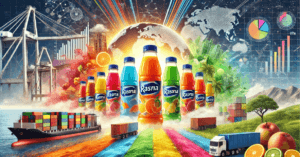How Rasna Is Outpacing Rivals & Thriving Despite Trump’s Tariff Threats!
Rasna, India’s leading soft drink brand, expects a 30% growth in exports this year despite global tariff concerns. Chairman Piruz Khambatta asserts that Rasna is better equipped than its rivals to handle US tariff changes. While China is known for offering low-cost products, Rasna remains the most affordable brand in the powdered drink segment due to its high production volumes. US President Donald Trump recently announced new tariffs on India, citing unfair import duties on American goods.
However, the Indian government clarified that no country-specific tariffs have been imposed despite Trump’s claims. Rasna’s export volume has doubled since the COVID-19 pandemic, reaching over 60 countries. The company is expanding its powdered concentrates, driving 30-40% growth in urban areas, while its Rs 5-10 packs continue to see 7-8% growth in rural markets.
To support expansion, Rasna is investing Rs 45-50 crore in a new manufacturing plant in Patna, focusing on litchi concentrate production. The company also aims for a larger share of India’s Rs 20,000-crore fruit drink market. E-commerce and quick commerce are major growth drivers, with quick commerce expected to double next year. Additionally, Rasna plans to expand internationally by introducing thicker fruit drink powders in bottles and tins.

How Rasna Is Outpacing Rivals & Thriving Despite Trump’s Tariff Threats!
Despite rising concerns over international trade tensions and tariffs, Rasna, a leading Indian soft drink brand, remains confident about achieving a 30% surge in exports this year. The company attributes its resilience to large-scale production capabilities and competitive pricing, which help it navigate challenges, including recent U.S. tariff announcements.
Competitive Edge in Global Markets
Piruz Khambatta, Chairman of Rasna International, highlighted that the company’s ability to offer affordable products without compromising quality sets it apart from competitors. While China is known for its low-cost exports, Rasna claims to be the most cost-effective brand in the powdered drink segment worldwide.
“Our affordability isn’t a result of cutting corners on quality,” Khambatta stated in an interview with ANI. “We achieve lower costs through large-scale production, which enables us to pass on savings to consumers.”
U.S.-India Trade Tensions
Rasna’s optimism comes even as U.S. President Donald Trump announced new tariffs on Indian goods starting April 2, citing “unfair” trade practices. Trump pointed out disparities in tariffs, such as the U.S. imposing a 5% duty on Indian agricultural imports, while India levies a 39% tariff on American farm products. Additionally, he criticized India’s 100% tariff on U.S. motorcycles, contrasting it with the 2.4% duty the U.S. applies to Indian motorcycles.
However, the Indian government has clarified that no country-specific tariffs have been imposed, countering Trump’s claims of trade imbalances.
Post-Pandemic Expansion
Since the COVID-19 pandemic, Rasna has doubled its export volume and now ships products to over 60 countries across five continents. This growth is fueled by increasing demand in Africa, the Middle East, and Southeast Asia. Rasna’s powdered drink concentrates, known for their convenience and long shelf life, have gained popularity in both developed and emerging markets.
Domestic Strategy: Urban Innovation and Rural Affordability
In India, Rasna is implementing a dual market strategy. In urban areas, the company is expanding its premium powdered concentrate range, aiming for 30–40% growth. These products cater to health-conscious consumers looking for natural flavors and preservative-free options.
In rural markets, Rasna’s ₹5–₹10 sachets remain popular due to their affordability, particularly in regions with lower purchasing power. Sales in these areas are projected to grow by 7–8%, supported by extensive distribution networks.
Investing in Capacity and Quality
To meet rising demand, Rasna is investing ₹45–50 crore in a new manufacturing facility in Patna, Bihar. This plant will specialize in litchi concentrate production, leveraging the fruit’s popularity in beverages. The company is also expanding its footprint in India’s ₹20,000-crore fruit drink market with upgraded products marketed as “richer, thicker, and tastier” than existing options.
E-Commerce and Quick Commerce Growth
Online retail is emerging as a major driver of growth. Rasna has partnered with e-commerce giants such as Amazon and Flipkart, while also leveraging quick commerce platforms like Blinkit and Zepto, which offer ultra-fast delivery. Khambatta expects this segment to double next year, calling it a “game-changer” for FMCG brands.
Global Ambitions: New Packaging, New Markets
Looking ahead, Rasna is preparing to introduce a thicker fruit drink powder in bottles and tins for international markets. This shift moves away from the sachets popular in India, aligning with premium branding strategies for Europe and North America, where consumers prefer sustainable and reusable packaging.
Looking Ahead
Despite trade uncertainties, Rasna’s focus on innovation, affordability, and strategic investments positions it for continued success. By leveraging its strengths in both domestic and global markets, the brand aims to cement its legacy in India while expanding its international presence.
Khambatta summed up the company’s vision: “Our goal is to deliver quality at a price everyone can afford. Whether in a remote village or a bustling city, Rasna aims to be the preferred choice for refreshing drinks.”
With these initiatives, Rasna is not just surviving global trade challenges—it is thriving, proving that adaptability and scale can transform obstacles into opportunities.
You must be logged in to post a comment.